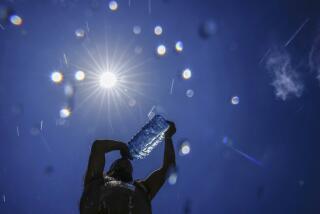Article Links Supplements and Heatstroke
- Share via
Ephedrine and creatine use among football players may be a factor in a surge of heatstroke deaths in the sport since 1995, according to an editorial published in a medical journal today.
The article appears in the journal “Neurosurgery” and contends dietary supplements designed to enhance performance may have a significant impact on the body’s ability to remain properly hydrated during stressful exercise in hot weather.
It is co-authored by Dr. Julian Bailes, chair of neurosurgery at West Virginia University and a consultant to the NFL Players Assn.; Dr. Robert C. Cantu of Emerson Hospital in Concord, Mass.; and Dr. Arthur L. Day of Brigham and Women’s Hospital in Boston.
Bailes, principal author of the report, said it is the first article in a medical journal linking ephedrine, creatine and heatstroke deaths in football.
The subject of heat-related fatalities is particularly timely because it is raised a year after Minnesota Viking tackle Korey Stringer became the first NFL player to die of heatstroke.
Dietary supplements containing ephedrine, a stimulant, were found in Stringer’s locker. Lawyers for his family contend “absolutely clean” toxicology tests showed the player had no supplements in his system.
The NFL last season added ephedrine to its list of banned substances and July 1 began randomly testing players for the stimulant. Creatine is not on the banned substances list, however.
“Our doctors say creatine does not pose significant risks and does not need to be on the list,” NFL spokesman Greg Aiello said. “Our people have identified ephedrine as a much more dangerous substance.”
League officials sent a letter to all players on July 11 emphasizing the dangers of ephedrine, the unfair competitive advantage it could provide and the negative message supplement use sends to younger players. The letter also said players will not be punished for taking ephedra-based cold and allergy medications in prescribed amounts.
The journal article cites statistics from the National Center for Catastrophic Sports Injury Research that document an average of 4.4 heatstroke-related football deaths from 1965 through ‘74, before awareness of proper hydration was widespread; an annual average of 1.7 such deaths over the next 10 years; then a reversal in recent years--after the 1994 deregulation of dietary supplements--with four deaths each in 1995, ’98 and 2000, and three in 2001.
Doctors contend in the article that ephedrine and related compounds sold as “herbal energy” products can have serious side effects on the heart and central nervous system, while increasing the body’s core temperature and decreasing its ability to cool.
Creatine, marketed as a muscle builder, can increase the likelihood of heatstroke because it has been shown to shift body water from the bloodstream into the muscle cells, the article says.
In comments published with the article, Dr. Allan M. Levy, an associate team physician for the New York Giants, warns of another dangerous concoction.
“The combination of ephedra, caffeine and aspirin causes weight loss by allowing the body to convert calories to heat rather than fat, thereby increasing core body temperature,” Levy writes, adding caffeine already dehydrates the body. “This combination is widely available and in frequent use by conditioning athletes.”
More to Read
Go beyond the scoreboard
Get the latest on L.A.'s teams in the daily Sports Report newsletter.
You may occasionally receive promotional content from the Los Angeles Times.











